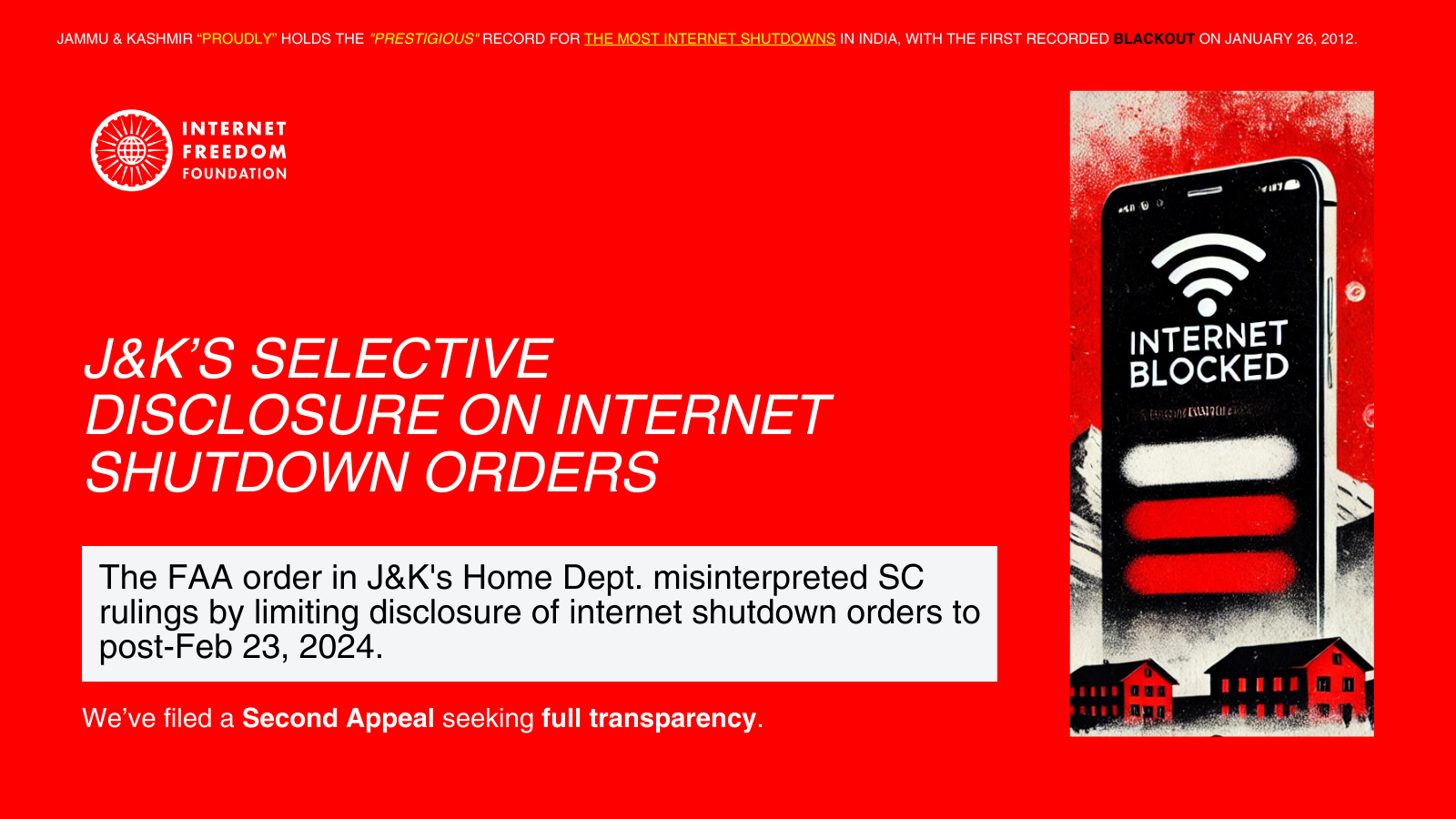
tl;dr
In our Appeal, the First Appellate Authority (“FAA”) in J&K’s Home Department has directed the Public Information Officer (“PIO”) to release copies of the Review Committee’s orders on internet shutdowns but only for those issued after February 23, 2024. As per our view, the FAA has misinterpreted the Supreme Court’s ruling and ignored the broader transparency mandate established in Anuradha Bhasin v. Union of India, which unequivocally requires all orders, including those issued by review committees to be published. Such incomplete compliance, rather than a proactive disclosure, dilutes the Supreme Court’s directives and allows opacity to persist. In response, we are filing a Second Appeal, to seek full disclosure of all Review Committee orders dating back to 2020.
Why should you care?
That the Hon’ble Supreme Court’s decision in Anuradha Bhasin v. Union of India, (2020) 3 SCC 637, and the order dated 23.02.2024 in Foundation for Media Professionals v. Union Territory of Jammu and Kashmir, Miscellaneous Application 1086 of 2020 mandated the Union and State Governments (along with Union Territory administrations) to publish all orders passed under the Temporary Suspension of Telecom Services (Public Emergency or Public Safety) Rules, 2017 (“Suspension Rules”). As the Internet shutdowns have been considered to violate the Fundamental Right, the Review Committee is the only oversight mechanism available under the law. Understanding its decisions and decision-making is crucial for advancing transparency in what is otherwise a highly opaque system.
Background
Internet shutdowns are legally permissible in India, but they must follow procedures and safeguards set down in law, including the Temporary Suspension of Telecom Services (Public Emergency or Public Safety) Rules, 2017 (“Telecom Suspension Rules”), and also the Supreme Court’s guidelines in Anuradha Bhasin. For instance, in the event an internet shutdown is imposed, a Review Committee must be constituted under Rule 2(5) of the Telecom Suspension Rules. This Review Committee must review all internet suspension orders within 5 days of their issuance and record its findings on the legality of such orders. This is not, by any means, sufficient oversight over the Internet shutdown process (for example, the Committee consists only of members from the Executive branch of the Government, and is not explicitly empowered to overturn an illegal Internet shutdown order), but it is nevertheless, the only oversight mechanism that has been provided under law to internet shutdowns.
To make matters worse, most of the Review Committees across the country do not publish their orders or findings publicly, and this information is also not often provided in RTI applications. Now, the First Appellate Authority in the Home Department of Jammu & Kashmir has responded to our First Appeal that all the review committee orders after the meeting which was held on 24.02.2024 are available on home department website.
This also came after a direction from the Hon’ble Supreme Court in the case of Foundation for Media Professionals v. Union Territory of Jammu and Kashmir, Miscellaneous Application 1086 of 2020 that mandated the Union and State Governments (along with Union Territory administrations) to publish all orders passed under the Temporary Suspension of Telecom Services (Public Emergency or Public Safety) Rules, 2017 (‘Suspension Rules’). However, it is important to note that the Supreme Court’s judgment dated February 23, 2024, did not limit the disclosure to prospective orders; it simply mandated that all orders be published. This directive does not imply that only orders issued after that date must be disclosed.
RTIs to track State-wise compliance with Anuradha Bhasin judgement
State Governments have continued to suspend the internet without complying with the Telecom Suspension Rules or the Supreme Court’s directions. Therefore, on May 15, 2024, as a part of our ongoing efforts to ensure compliance with Anuradha Bhasin guidelines, we filed an RTI application bearing reference no. IFF/RTI/2024/112 dated May 15, 2024 with the Department of Home of the Government of Jammu & Kashmir to seek information pertaining to instances of internet shutdowns in the Union Territory of J&K since January 10, 2020 (date of judgement in Anuradha Bhasin case).
In the RTI application to the Home Department of J&K, we applied for information on, among other aspects, the number of suspension orders issued in the UT since January 10, 2020, whether a Review Committee had been constituted, and the findings of the Review Committee. In its response dated June 06, 2024 the PIO disclosed information relating to all other questions, but refused to provide the findings of the Review Committee, claiming that the information is exempted under the Section 8 of the RTI Act, 2005. Aggrieved by this response, 06.07.2024, we filed a First Appeal, contending that the reply submitted by the PIO was (a) devoid of reasons and suffered from non-application of mind; and (b) the orders of the Review Committee are not exempt under Section 8 of the RTI Act. Thereafter, we received a notice from the First Appellate Authority requiring us to appear for a hearing on July 07, 2024.
First Appellate Hearing and direction by PIO
During the hearing, IFF argued that the reply filed by the PIO was invalid and must be set aside as it was not in compliance with the directions in Anuradha Bhasin as per which orders passed by the Review Committee must be made available for an effective challenge before constitutional courts. IFF further submitted that the response was devoid of reasons and suffers from non-application of mind as it merely states that information is exempted under Section 8 of the RTI Act without providing reasons to substantiate the same. We argued that in Ashlesh Biradar v. State of West Bengal, the Calcutta High Court had been pleased to direct the State Government to tender to us the findings of the Review Committee.
Following the hearing, the First Appellate Authority (“FAA”) in Jammu and Kashmir’s Home Department vide its order dated August 05,2024, directed the Public Information Officer (“PIO”) to release copies of the Review Committee’s findings concerning internet shutdown orders. The FAA also noted that the PIO should have specified and justified the particular provisions of Section 8 of the RTI Act that were used to withhold information.
Non-Compliance of First Appellate Order and our persistent efforts
Despite this clear directive, the PIO failed to provide the requested information. To address this non-compliance, we sent a Compliance Letter on October 15, 2024, urging adherence to the FAA’s order. However, in a reply dated October 29, 2024, the PIO responded that the information was “not available in the records” of the department. This response was not only evasive but also an outright refusal to comply with legal obligations.
In response to this continued obstruction, we filed another First Appeal on November 30, 2024 to challenge the PIO’s refusal to disclose the requested information. We argued that under Section 6(3) of the RTI Act, 2005, if a public authority does not hold the requested information, it is legally required to transfer the RTI application to the appropriate authority rather than rejecting it outright. Additionally, we contended that even if certain portions of the requested information were exempt from disclosure, Section 10(1) of the RTI Act mandates that access must still be granted to non-exempt portions that can be reasonably severed from the exempt content. Furthermore, we emphasized that the orders of the Review Committee, constituted under Rule 2(6) of the Temporary Suspension of Telecom Services (Public Emergency or Public Safety) Rules, 2017, do not fall under the exemptions provided in Section 8 of the RTI Act. The Supreme Court, in Anuradha Bhasin v. Union of India (2020) 3 SCC 637, explicitly held that all orders issued under the Telecom Suspension Rules must be made public, reinforcing the obligation of transparency in internet shutdown decisions.
Following the hearing on 09.01.2025, the First Appellate Authority (FAA) once again directed the PIO to release the Review Committee orders. However, this time, the FAA limited the disclosure to orders issued only after February 23, 2024, the date of the Foundation for Media Professionals (FMP) judgment. While this ruling marked a partial victory, it fell short of ensuring complete transparency. The FAA’s decision to restrict disclosure to post-2024 orders is legally flawed because Anuradha Bhasin had already established that all internet suspension orders must be published, regardless of the date of issuance. The FMP judgment does not impose any restriction on disclosure to only post-2024 orders; rather, it reinforces the need for comprehensive transparency in internet shutdown decisions.
Reluctant compliance and incomplete transparency
Although the First Appellate Authority (FAA) ordered for providing information to us, it failed to adequately assess the scope, nature, and time period of the information requested. Instead of directing full disclosure, the FAA selectively instructed the CPIO to provide only the final orders issued by the Review Committee after February 23, 2024, the date of the Supreme Court’s ruling in Foundation for Media Professionals v. Union Territory of Jammu & Kashmir (“FMP”). By relying solely on the FMP judgment, the FAA overlooked the broader mandate set by the Supreme Court in Anuradha Bhasin v. Union of India, which unequivocally held that all orders issued under the Telecom Suspension Rules, 2017 must be published (Paras 104-108). This obligation extends to Review Committee orders issued prior to the FMP judgment as well, yet the FAA’s order dated January 9, 2025, failed to address these earlier records. By misapplying the FMP ruling and limiting disclosure without sufficient justification, the FAA effectively diluted the Supreme Court’s directive on transparency in internet suspension decisions.
Way forward
To challenge this flawed response from the First Appellate Authority, we are filing a Second Appeal before the concerned authority, demanding the disclosure of all Review Committee orders dating back to 2020. The FAA’s arbitrary restriction to orders issued only after February 23, 2024, not only misinterprets the Supreme Court’s rulings but also weakens the broader transparency mandate established in Anuradha Bhasin.
Moreover, the lack of proactive disclosure of these orders violates the fundamental principles of the RTI Act, 2005. Under Section 4 of the Act, public authorities are legally bound to suo motu publish information that is of public interest. The Review Committee’s orders, being integral to the functioning of the Telecom Suspension Rules act as a needed safeguard and should have been made available without the need for repeated RTI requests. Instead, the consistent opacity surrounding internet suspension orders forces us to engage in a prolonged legal process for access to information that should already be in the public domain.
IFF remains committed to ensuring transparency and accountability in internet shutdown decisions. Our efforts will continue until the state upholds its constitutional and statutory obligations by making all internet suspension orders and review committee orders publicly accessible, as mandated by law.
Important documents
- RTI Application dated May 15, 2024 [Link]
- Response to RTI dated June 06, 2024 [Link]
- First Appeal dated July 06, 2024 [Link]
- First Appellate Authority order dated August 05, 2024 [Link]
- Compliance letter dated October 19, 2024 [Link]
- Response to Compliance letter dated October 29, 2024 [Link]
- Another First Appeal dated November 30, 2024 [Link]
- First Appellate Authority order dated 09.01.2025 [Link]

